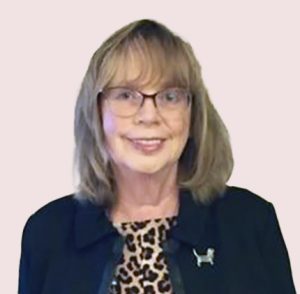News From the Top
President’s Message – March 2024
 February was a busy month for your PSWA Board! Our yearly board meeting was held February 27th and 28th, and we had a lot to cover. Our major agenda items centered around organization communication and effectiveness.
February was a busy month for your PSWA Board! Our yearly board meeting was held February 27th and 28th, and we had a lot to cover. Our major agenda items centered around organization communication and effectiveness.
First, we updated the PSWA by-laws. Much has changed since the last revision in 2012—all for the good of the organization. We cleaned up and clarified a few ambiguous entries to make the by-laws more informative, and we standardized some language. As the organization has grown, we needed to expand the number of board members from four to “up to 9.” Added to the original four—President, Vice President, Treasurer, and Secretary—are Conference Chair, Writing Competition Chair, and Newsletter Editor, with up to two Members-at-Large, positions that are unfilled at this time.
Second, we are launching an aggressive program to recruit new members and increase the number of conference attendees. A priority will be updating the website so that it works better for us: appealing, informative, and easier to navigate and maintain. We’re revamping the corporate Facebook page. And, we’re working on a tri-fold recruitment brochure, copies of which will be available to you.
Some of our communications efforts will require help from our members, so we will be asking for your aid. For example, we are seeking a website designer familiar with WordPress, the software we use to manage site content, and we need two volunteers to serve as website admins. Of course, all members can help our new information and recruitment initiative. We encourage you to share the new brochure with colleagues and display it at your other conferences, book events, craft fairs, and so on. Also, it would be helpful to share the public PSWA Facebook page with members of other writing groups and social media you participate in.
We discussed the painful fact that conference costs—for meeting rooms, equipment rentals, catering, and so on—continue to rise, which may necessitate a modest increase in the conference registration fee. If you attend other writers’ conferences, you know that, even with an increase in price, our PSWA conference will still be the best value going. A final decision on this will be made after the July meeting, and please note that increased membership/attendance can minimize such increases.
Lastly, a reminder: please adhere to the rules provided below regarding posting on the PSWA email listserv. They are specific and clear on what is and is not appropriate. In a few (not many) recent incidents, mostly unintentional, violation of these rules resulted in problems. Note that, because of the way our listserv works, it’s very easy to think you’re responding to someone personally, but the whole list receives your message. Don’t hit “reply”; start a completely new email for any private messages you want to send. They are, of course, your business and not prohibited. Just make sure they are not going out to everyone.
Hope to see you at the Orleans Hotel/Casino July 12/13/14! From what has been done so far, the 2024 conference will be a doozy! And, don’t forget the pre-conference workshop on Thursday, July 11, which I encourage you to attend. I have always found our workshops rich with information and collegiality.
Keep on writing!
Best wishes,
John Schembra, PSWA President
Listserv Prohibitions
- Inappropriate or dangerous behavior at PSWA events, on the website, the e-mail listserv, or involving other PSWA members.
- Selling or distributing the PSWA membership list to any other individual or organization.
- Member behavior with the potential to discredit the PSWA.
- Posting inappropriate messages or photos. This includes political posts, harassment of others, derogatory posts about other people (whether members or not), racist or homophobic posts, posts containing inappropriate language, and any other offensive statements or material.
Please remember: violating these rules can lead to loss of posting privileges.
Vice President’s Report
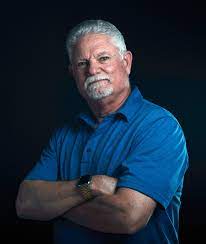 As PSWA’s new Vice President, my number one goal is membership. While we have a great team of members, we need to promote that outside the existing group. To stay a strong organization, we need to grow, and that means selling ourselves to people we think are good member candidates. We are our own best salespeople.
As PSWA’s new Vice President, my number one goal is membership. While we have a great team of members, we need to promote that outside the existing group. To stay a strong organization, we need to grow, and that means selling ourselves to people we think are good member candidates. We are our own best salespeople.
While we pride ourselves on the depth of members’ knowledge, evident on our listserv, we still have holes in some areas. We would benefit from adding more crime scene investigators, fire fighters, dispatchers, and all the other professional subsets in the public safety community. I would like to see us gain five new members by the time the conference opens in July, and it would be great if they could attend.
With membership on my mind, several past members still need to renew. Although I have only been a member for a few years, I can easily see the value that PSWA membership brings.
Steve Ditmars, PSWA Vice President
Secretary’s Report
 If you haven’t stopped by PSWA’s Facebook business page please do so and hit the “like” button, which will allow you to see the new content we’ll be posting. Our business page is “outward facing,” meaning that it is supposed to bring new people to the PSWA.
If you haven’t stopped by PSWA’s Facebook business page please do so and hit the “like” button, which will allow you to see the new content we’ll be posting. Our business page is “outward facing,” meaning that it is supposed to bring new people to the PSWA.
Our Facebook private group looks similar, but it’s quite different. It’s for conversations within the membership (“inward facing,” much like the listserv).
The Business Page content is geared toward engagement and needs a consistent, positive message. We’ll post infographics and other tidbits that outside writers about public safety issues might find useful. These are topics that, we hope, would encourage someone to join and participate in our organization.
We’ll also ask visitors questions such as “what are you currently reading?” or “are you a pantser or plotter?” These are not hard-hitting questions. They’re meant to be fun and build a community.
Occasionally, we will post an invitation to join the PSWA. Marketing experts recommend nine pieces of content before asking your customers to buy. Ever see a fellow author post “buy my book” thirty days in a row and achieve no engagement from their followers? That’s why.
I’m letting you know this in the hope that PSWA members will also engage with the Business Page. It needs to be active, and we can start by recommending it to others. It doesn’t take much, just a simple comment or even a like will do.
Activity breeds activity. Thanks in advance.
Colin Conway, PSWA Secretary
Treasurer’s Report
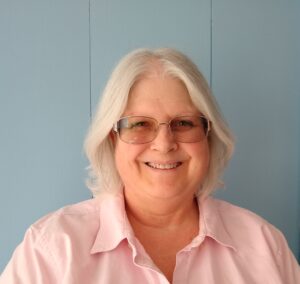 For this year’s conference, we are continuing our three opportunities for advertising and promoting your books. You can advertise in the conference program, donate swag items for the conference bags, and sponsor portions of the meeting(coffee service, for example). All are great ways to support our conference!
For this year’s conference, we are continuing our three opportunities for advertising and promoting your books. You can advertise in the conference program, donate swag items for the conference bags, and sponsor portions of the meeting(coffee service, for example). All are great ways to support our conference!
If you have questions regarding any of these opportunities, please reach out to me at peacock.kelli3@gmail.com. This will be another wonderful conference, and I look forward to seeing all the great items and ads we receive.
Conference Program Advertising Specifics
There is no limit on the number of the ads we can accommodate inside the book. The opportunity to advertise is open to any PSWA member whether attending the conference or not.Below are the requirements and costs to advertise in the 2024 PSWA conference program.
Deadline: Please send your advertisement to me at the address above, no later than June 10, 2024.
Payment: You may make your payment via PayPal, addressed to treasurer@policewriter.com
Format: Your advertisement may be in the following formats: .doc, .pdf, or .jpg. All ads will be in color.
Prices:
*Inside front cover, inside back cover, and outside back cover – $250
*Full page inside the book – $200
*Half-page (horizontal) inside the book – $100
*Quarter-page (vertical) inside the book – $50
Dimensions: You can discuss the exact dimensions your ad should be with Kelli when you reserve your spot.
Swag for the Conference Bag
We are asking members for items they would like us to place in the conference bags. We’d love to have your crime-related or promotional items. Examples of what we are looking for are postcards, keychains, bookmarks, mini sewing kits, eyeglass cloths, and the like. The possibilities are endless. All we ask is they are small, and not breakable (people are traveling!)—so no mugs, cups, water bottles, etc. We will need no more than 50 of each item. Please mail them to me no later than July 1, 2024. We won’t be able to add materials at the conference; they must be sent ahead of time (a change from past years). SEND TO: Kelli Peacock, 8983 E Orchid Vine Dr., Tucson, AZ 85747
Conference Sponsorships
Please let Kelli know if you’d like to have (or share) sponsorship of one of the coffee/tea/fruit services at the conference. Sponsorships are available for meeting sessions (five of these), and the Thursday and Saturday evening parties. Each sponsorship is $160. If you want to share with someone, that’s awesome. You’ll be recognized in the conference program, and a tent card with your name(s) will be on display during your time slot. Please let me know whether you’re interested, so I can check availability and provide payment instructions.
Kelli Peacock, PSWA Treasurer
Conference Program Report
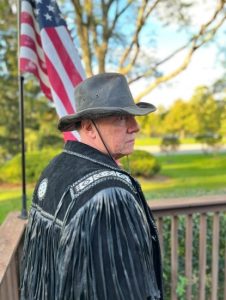 Greetings! Unbelievably, spring is starting to push out Old Man Winter here in Chi-town as the temps, usually in the high teens or low twenties this time of year, keep bouncing back and forth between forty and sixty. I’m still waiting to see my first robin of spring, but I’ve heard rumors that a few of them have already braved the flight north. Seeing those migratory songbirds always brightens my spirits after the early darkening days of winter. This year’s been exceptionally challenging for me personally and for my fellow PSWA board members. But please believe me when I say we’re marshalling our forces and are working together to make the 2024 conference one of the best ever.
Greetings! Unbelievably, spring is starting to push out Old Man Winter here in Chi-town as the temps, usually in the high teens or low twenties this time of year, keep bouncing back and forth between forty and sixty. I’m still waiting to see my first robin of spring, but I’ve heard rumors that a few of them have already braved the flight north. Seeing those migratory songbirds always brightens my spirits after the early darkening days of winter. This year’s been exceptionally challenging for me personally and for my fellow PSWA board members. But please believe me when I say we’re marshalling our forces and are working together to make the 2024 conference one of the best ever.
Pre-Conference Workshop
I’m happy to share some excellent news about the 2024 Pre-Conference Workshop. This workshop digs into the details of good crime writing and gives you the opportunity to have 30-35 pages of your manuscript critiqued by one of the workshop’s expert instructors! (Send your double-spaced pages to Mike Black by May 31.)
On the agenda this year are PSWA members Mike Black (story setting) and Kelli Peacock (compelling dialog) and we’ve added some new blood: Wolfpack Publishing acquisitions editor, Paul Ishop (will discuss plotting), author and former LAPD homicide detective Mike Brandt (writer’s bible); and member and former writing professor Jim Christ (creating believable characters). At only $45 extra to cover the room cost, it’s a real steal, er, deal. Sign up today!
Volunteer Opportunities
Based on last year’s success with the raffles during the conference, we will continue them this year, and will be seeking volunteers to contribute prizes. And, for you shutter-bugs: the meeting needs a photographer! Please contact Barbara Hodges (barbaramaehodges@gmail.com) to discuss your proposed raffle prize: If your prize is a physical object (versus a service, membership, etc.), it can be sent by June 15 to Barbara at 187 Alyssum Circle, Nipomo, CA 93444.
Well, that’s about all from Black’s Corner. Just a reminder, PSWA dues were due in January. If you haven’t renewed, don’t forget. And register for the 2024 conference if you haven’t done that yet either. Just go to the website and click on CONFERENCE. It’s as easy as one, two, three. Take it from me, you won’t want to miss this one!
Stay strong,
Michael A. Black, Conference Program Chairman
Writing Competition Report
Back from Las Vegas and the board meeting. It seems that as I get older it takes me longer to get up to speed once I’m home. The board meeting was terrific. Our new board members are such a plus. Their fresh eyes see what’s great about PSWA and how it—and the writing competition—can be even better.
We discussed a number of member suggestions about the competition, some of which can be implemented this year and others that may have to wait. Suggestions include:
- A new name for the competition (along the lines of the Agathas, Anthonys, Edgars, Shamus, Derringer, and other “branded” awards). If you have a suggestion, please send it to me!
- We talked about the word count for our short stories and whether to continue to allow multiple submissions. Ultimately, we voted to keep our requirements as they are. A lot of changes were implemented for the 2024 competition, and we need to see how those shake out before changing once again.
The 2024 competition is going strong, with fantastic writing as usual. I am hoping to see more short fiction, flash writing, non-fiction articles, and poetry. If you are one of our wonderful book authors, think about taking up the challenge of sending in something different. You have until March 31st to send your submissions to me.
This year’s competition will inaugurate a new award for Best Book Cover, as determined by our judges. (I love that we are adding this award. Covers are so important to the success of your book. See John Shembra’s article below.) And, on Sunday, the award-winning books will be placed in a special spot in the bookstore, to make it easier for members not to miss these great reads!
After much discussion, the board decided that next year we must raise our writing competition fees, due to the rising cost of printing and postage. Starting on January 1, 2025, the fee will be $30.00 for an author’s first entry and $20.00 for each subsequent entry. And, maybe we’ll add an award for “best book title,” too.
Finally, here’s a shout-out to our terrific set of volunteer judges. They receive nothing for their time and expertise but our heartfelt thanks.
That’s it for me. I hope to see all of you at the conference in July. Our awards event is one of
the highlights!
Barbara Hodges, Writing Competition Chairman
Conference-Related Deadlines
See above reports for details (KP = Kelli Peacock; MB = Mike Black; BH = Barbara Hodges)
- March 31 – Writing Competition (BH)
- May 31 – 30-35 pages of your manuscript for critique at the annual conference workshop (MB)
- June 10 – Conference program ads (KP)
- June 15 – Prizes for raffle (BH in Mike Black’s report)
- July 1 – Swag for conference bags (KP)
Member News
Our Corporate Members
Mike Black and Steve Ditmars—who have gone the extra mile by renewing at our higher level—have news this quarter.
Mike Black had two new releases out in late February. He says, “How’s that for a belated Valentine’s Day present? <Grin>” A short story called “Tracks of the Beast” appears in the anthology, CNI Classified, Volume 2. It’s a Team Intrepid pulp-style story featuring characters created by Rob Mendenhall—a long-time friend of Mike’s and a really talented writer. Mike also has a brand new novel under his AW Hart pseudonym: Concho: Border Blood, featuring modern-day Texas Ranger, Concho Ten Wolves, a six-foot-six half-Black, half-Indian Ranger operating out of Eagle Pass, Texas. In this volume of the series, Concho tangles with unscrupulous human traffickers and drug smugglers. For a start. Says Mike: “I owe a lot to good old AW Hart. He’s my claim to fame as being an Amazon Best Seller. <Second Grin>”
Steve Ditmars has translated his experience as a police service dog handler and K9 Unit supervisor in Long Beach, California, (and his love of dogs!) into two popular and award-winning books so far—Big Dogs and Gasping for Air. Now, he says, a third in the series is coming soon: Big Dogs Three—Ghost Stories. Watch for it!
More Member News
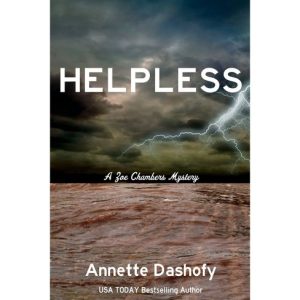 Annette Dashofy is a nominee for a Malice Domestic 36 Agatha Award for her 2023 Zoe Chambers mystery novel, Helpless. Congrats, Annette!
Annette Dashofy is a nominee for a Malice Domestic 36 Agatha Award for her 2023 Zoe Chambers mystery novel, Helpless. Congrats, Annette!
Jim Guigli’s short story “Supply and Demand” is forthcoming in an anthology tentatively titled Let Me Tell You About . . . To be published by Murderous Ink Press sometime this year.
 Prestigious publisher, marketer, and distributor of ebooks, Open Road Media, has contracted with Ilene Schneider to reproduce her Rabbi Aviva Cohen Mysteries—great new covers too!
Prestigious publisher, marketer, and distributor of ebooks, Open Road Media, has contracted with Ilene Schneider to reproduce her Rabbi Aviva Cohen Mysteries—great new covers too!
John Bluck’s short story, “Cold in Chicago,” will appear in the anthology, Through the Past Darkly, (channeling Mick, are we?) scheduled for publication June 11.
As a follow-on to her 2022 true-crime book about the murder of her sister-in-law, Simple, Safe & Secret: The 1981 Murder of Joan L. Webster, author Eve Carson continues to pursue justice. She was interviewed by CUTV (CloseUp TV) on 27 January this year, air date not yet announced. CUTV will interview her again in March 2024 for its radio platform. Eve also reports she is establishing a nonprofit foundation, Victims of Injustice Speak, to bring attention to cases like Joan’s.
 George Cramer (pictured) will be a panelist at the 2024 Left Coast Crime conference, April 11-14, in Seattle. His panel is “Tough Topics: Writing about Addiction, Mental Illness, PTSD, and other difficult subjects.” Also at LCC, George and renowned Police Psychologist Dr. Ellen Kirschman are offering Coffee with a Cop for a no-holds-barred conversation about cops, real and fictional. Make a free ticket reservation for Coffee with a Cop at https://CoffeeWithCop.eventbrite.com
George Cramer (pictured) will be a panelist at the 2024 Left Coast Crime conference, April 11-14, in Seattle. His panel is “Tough Topics: Writing about Addiction, Mental Illness, PTSD, and other difficult subjects.” Also at LCC, George and renowned Police Psychologist Dr. Ellen Kirschman are offering Coffee with a Cop for a no-holds-barred conversation about cops, real and fictional. Make a free ticket reservation for Coffee with a Cop at https://CoffeeWithCop.eventbrite.com
A corollary benefit of attending the 2024 PSWA conference is that you may have the chance to be interviewed by Frank Scalise for his podcast: “Wrong Place, Write Crime.” He promises he’ll be providing more information and reminders via the listserv.
Vicki Weisfeld had a private eye story—rough-around-the-edges PI and sexy new client—in the Valentine’s Day issue of Yellow Mama, Issue #102 (you can read it online). In this story, the PI is a woman and the sexy client a man.
Stop the Threat by Sally Handley
Reviewed by Michael A. Black
 I read PSWA-member Sally Handley’s excellent thriller, Stop the Threat, before last year’s conference and was surprised it didn’t take top honors in our writing competition. It reads like it was yanked from today’s headlines and makes a thorough and thought-provoking examination of school shootings, as well as some of the problems that cause them. Ms. Handley handles multiple points of view with the mastery of an accomplished writer, enabling a comprehensive examination of the various opinions and theories on how to prevent and manage school shootings.
I read PSWA-member Sally Handley’s excellent thriller, Stop the Threat, before last year’s conference and was surprised it didn’t take top honors in our writing competition. It reads like it was yanked from today’s headlines and makes a thorough and thought-provoking examination of school shootings, as well as some of the problems that cause them. Ms. Handley handles multiple points of view with the mastery of an accomplished writer, enabling a comprehensive examination of the various opinions and theories on how to prevent and manage school shootings.
In her novel, a small-town school board decides to arm and train the district’s teachers with handguns. Handley is a former teacher herself and has a deep knowledge of the setting and the dynamics. Stop the Threat, is a phrase common in law enforcement circles for how to deal with an active shooter.
The author avoids a one-sided political diatribe. Instead, she provides a balanced and thorough examination of the subject. The characters are well developed, complex, and realistic—not a cardboard one in the bunch. School Resource Officer Jeff Stone must implement the new gun-carry policy, even though he opposes it, and English teacher Ellen McCall has private reasons for not wanting to carry a gun. You’ll find yourself becoming emotionally involved as they’re caught in the situation’s increasing disorder that threatens to spiral out of control. You’ll be on the edge of your chair as the story races toward its inevitable and surprising climax.
If you think you have a solid grasp on what’s causing the nation’s rash of school shootings and the best way to deal with them, think again. This novel will open you up to perspectives you may not have considered. When you take a walk in these characters’ shoes, Stop the Threat will keep you entertained and give you plenty to think about.
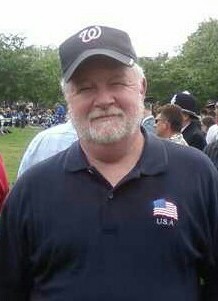 Read Patrick Weill’s Exciting Book Excerpt!
Read Patrick Weill’s Exciting Book Excerpt!
PSWA member Patrick Weill has made available to PSWA members a chapter of his upcoming action thriller, Double Threat. You can read it here. Weill says it also works as a short story, so here’s a chance to read an entertaining adventure told from the point of view of a German shepherd! If any members are book reviewers, advance review copies of Double Threat will be available in May. Just contact Patrick at pbw@patrickweill.com.
Joe Haggerty: Star Reader!
If PSWA had such an award, looks like Joe (pictured) would have earned it this quarter! He says: “I’ve read a lot of PSWA members’ works lately and reviewed them on Amazon,” including George Cramer’s New Liberty, Frank Zafiro’s Under A Raging Moon, Billy The Liquor Guy’s Under Too Long, Marilyn Meredith’s Not As We Knew It, Larry K. Collins and Lorna Collins’s Murder, They Wrote, and Mike Black’s Legends of the West: A Deputy Marshal Bass Reeves Western.” PSWA member Keith Bettinger gave him a tip about a great book detailing exploits of the US Special Forces, with terrific photographs of their training, weapons, and the aircraft they used.
The Writing Craft: Upping Your Game
Key “Reader Magnets”: Cover Art and Title
By John Schembra
As authors, we are repeatedly reminded of features that will convince readers to buy our book(s). We’re told that if we don’t capture their interest in the first few pages, we’ll lose the sale and, perhaps, a future reader. As a result, we may rewrite a story’s beginning many times, struggling to make it perfect. I like to think we are successful more often than not, but sometimes our opener isn’t as captivating as we want to believe. Thank goodness for editors! We’d be lost without them!
If we concentrate too much on those opening sentences and paragraphs, we can easily overlook two other important factors that attract potential readers and encourage them to look more closely. I’m not talking about the back-cover blurb. Yes, it’s important, but I, personally, have never relied on ten lines of text to persuade me to buy a book.
I’m talking about titles and cover art.
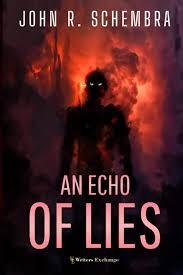 I’ve been an avid reader all my life, and before I ever thought of becoming a writer, I would spend an inordinate amount of time at bookstores, perusing the shelves and tables. What I first looked for was an eye-catching cover, one with an inkling of the story’s main premise. If it was attractive enough to keep my interest, I’d assess the book’s title. It, too, had to be intriguing. The combination of compelling cover and title would result in a closer look, and often, a sale.
I’ve been an avid reader all my life, and before I ever thought of becoming a writer, I would spend an inordinate amount of time at bookstores, perusing the shelves and tables. What I first looked for was an eye-catching cover, one with an inkling of the story’s main premise. If it was attractive enough to keep my interest, I’d assess the book’s title. It, too, had to be intriguing. The combination of compelling cover and title would result in a closer look, and often, a sale.
I’m lucky to have an understanding publisher who knows how much input I like to have on the cover art and title. My books are MY books. By the time I finish writing one, I have a clear idea for the cover. I subscribe to Pixabay, one of the royalty-free image sites with thousands of free photos, drawings, and other graphics that I scroll through in search of the right image.
For example, the cover photo I envisioned for my book Blood Debt had a body lying on the ground with a gun nearby and several bundles of bloodstained money strewn about. For An Echo of Lies, my demonic possession book, I envisioned a smoky, tenuous image in a hellish background. Since I couldn’t find an appropriate image readymade, I sent this description to the cover artist, and the result fit exactly what I had imagined.
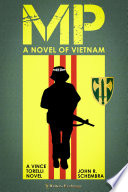 I have had varying degrees of input on the cover art of all my books. I’m usually able to find the perfect image, and am very pleased and satisfied with the skill of the artist. I must give kudos here to the artist who created the cover for my first book, M.P., A Novel of Vietnam, the story of a young military policeman and what he faced during a terrible year in Southeast Asia. It’s based in part on some of my experiences overseas as an MP in 1970. It’s special to me, not only because it was my first book, but because the artist was my son!
I have had varying degrees of input on the cover art of all my books. I’m usually able to find the perfect image, and am very pleased and satisfied with the skill of the artist. I must give kudos here to the artist who created the cover for my first book, M.P., A Novel of Vietnam, the story of a young military policeman and what he faced during a terrible year in Southeast Asia. It’s based in part on some of my experiences overseas as an MP in 1970. It’s special to me, not only because it was my first book, but because the artist was my son!
But the book’s cover is only half of its “first impressions” story. Next comes the title, which should give a hint of what the story is about.
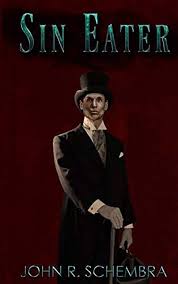 As an example, my fifth book is titled Sin Eater. In the 18th and early 19th centuries, a Sin Eater was a person who ministered to the dying. Much like a priest administering last rites, the Sin Eater would perform a ritual over a dying person, taking on the burden of that person’s sins, cleansing his soul, and clearing his path to heaven. It sounded like a mentally disturbed serial killer to me!
As an example, my fifth book is titled Sin Eater. In the 18th and early 19th centuries, a Sin Eater was a person who ministered to the dying. Much like a priest administering last rites, the Sin Eater would perform a ritual over a dying person, taking on the burden of that person’s sins, cleansing his soul, and clearing his path to heaven. It sounded like a mentally disturbed serial killer to me!
But what would the book’s cover look like? I envisioned a creepy, scary person, dressed in 19th century garb. I found three photos that suited the purpose. They had the right facial expression, the right clothing, and carried a cane and a small bag, much like a doctor’s satchel. I sent them to the cover artist, he worked his magic, and I had the cover with the title I wanted.
As many of you have learned in your author journey, there is a lot more to writing a book than putting words to paper. If you expect to turn out a product people will buy, you need a complete package—a title that is intriguing, cover art that is eye-catching, and a great first chapter! It gives me a solid sense of accomplishment to participate in the cover design and title selection. I would miss not having that opportunity.
Thanks for taking the time to read this. Please take a look at my webpage for more information about my books. The first chapter of six of them is posted there, along with some short stories.
Writing Police Right
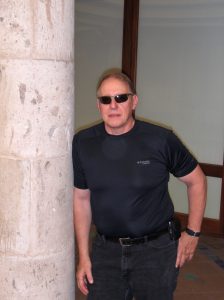
On behalf of her local Sisters in Crime chapter, member Kate Flora organized a February 17 Zoom featuring PSWA members Mike Black and Bill Powers, along with noted crime writer and retired detective sergeant Bruce Robert Coffin. The subject, Writing Police Right, follows on the heels of Kate’s excellent blog post on the topic (read it here). Her post emphasizes a point she made repeatedly in the panel discussion: the need for authors to get past their reticence to reach out to public safety officers. But where should you start? With the department’s public information officer, if it has one. Small departments won’t, but if you ask around “someone in your world will have a contact,” Flora said. If need be, make a cold-call. Remember: these public servants generally want to be a writer’s partner in getting stuff right.
Some Key Discussion Highlights
Mike Black said, “Even some of the big guns miss the mark when it comes to portraying a cop’s attitude and mentality.” Panelists believed you can tell when an author (book, story, script) relies on television and the movies for their understanding of how public safety officers work and think. They need to dig deeper. (Flora’s terrific book on police shootings, Shots Fired, is a must-read.)
“Go to the source,” said Coffin. He advised coming into these interactions with an open mind and getting to know the person (patrol, detective, chief), not just the job. “It’s important to understand how the experience has affected them,” he said. Too often, stories neglect the job’s overwhelming stress and PTSD, job demands exacerbated by long, unpredictable hours.
Police hierarchy and job titles are easy to get wrong, and they vary across jurisdictions. Hierarchy determines who is in charge of an investigation. According to Powers, in Massachusetts, district attorneys have jurisdiction over all death investigations in their county. Each DA’s office has a cadre of State Police officers who serve as its investigative designees. They work with local police detectives in the city or town where the death occurred, but the State Police, as the DA’s representatives, are “in charge.” In the Commonwealth’s three major cities (Boston, Worcester, Springfield), the DA designates local officers to investigate.
Stressing the importance of detail, Black said homicide investigators cannot take a narrow view of a case. They may have many leads to follow up on, and new crimes keep impinging on the time available to pursue those earlier leads. In an era of diminished resources, this puts a strain on the system and the people in it.
Flora asked, who’s at a crime scene? Coffin responded, “No one who doesn’t have business being there.” Crime scene technicians of course are present, and help sort out any contamination from EMS personnel and evidence left by, for example, other household members. The body “belongs” to the Medical Examiner who is often on scene; but if logistics prevent this, the ME may guide a police detective over the phone to assure getting the right photos and other evidence. And, it may take quite a while to assemble everyone who’s needed on site.

Powers said that, at least in Massachusetts, the Medical Examiner—not the police or the prosecutor’s officer—determines whether a death was a homicide, suicide, accident, or from natural causes. Out of necessity, he said, all death investigations begin as presumed homicides, so that evidence is preserved and statements are taken. (Surprisingly, 11 US states still use the antiquated coroner system, and another 18 have coroners in some counties. Coroners are elected officials and may have neither legal nor medical training.) When an autopsy is conducted, a law enforcement or crime lab technician will attend, collect any evidence for crime lab testing, and preserve and document the progression and continuity of the evidence—the “chain of custody.”
Warrants, Weapons, Interviews
Warrants are complicated and time-consuming to obtain. Except at an active crime scene, police need search warrants before any in-depth exploration of the scene (or scenes)—a suspect’s home, car, office, fishing cabin, or all of these—as well as other places evidence may hide, such as computers, cell phones, and financial records—so the smart rule of thumb is to apply for the search warrant before exploring any potentially relevant locations.
A warrant must establish probable cause to search in particular places for particular items connected to the alleged crime. It must be written up properly and cover all the locations expected to be searched. The warrant application is usually reviewed by the district or state’s attorney, then presented to a judge for approval. The approval is time-limited, and the investigators must report back to the judge. Once the warrant expires, a new, updated warrant is needed even to revisit previously investigated locations. These rules ensure that the authorities can prove they gathered all their evidence legally and under the Court’s authority, which is what makes it admissible during a trial. If an investigator finds something unexpected, not covered by the warrant, an addendum may be needed so that the new evidence can be seized. Having collected the evidence, investigators don’t talk about it—not with family, not with amateur detectives or reporters (sorry, authors!), not even other police.
Weapons are another enormous area of misinformation. Writers love to have their characters “rack a round.” (I’ve made this mistake myself.) Coffin said, “Every police on duty goes out ready to shoot.” This, despite the fact they likely fire their guns rarely, if ever. Officers can choose which specific gun and ammunition they want from an approved list. Less lethal tactics sometimes work, but an officer’s level of force has to increase as the threat rises. “You shoot to stop the threat,” said Black, “not to kill the offender.”
For a defendant’s statements to be admissible in court, Powers said, the prosecution must be able to prove they were made knowingly (by demonstrating the Miranda warnings were both read and signed off on), intelligently (defendant was sober), and voluntarily (Miranda again). In serious felony cases, interviews are videotaped.
Panelists agreed that, in general, police officers are happy to have body and dashboard cameras recording their activities, but it’s expensive for a jurisdiction to purchase and maintain the technology, much less store all the data. When citizens complain about unfair treatment by police, camera footage may help level the playing field. Seeing actual footage of the encounter often puts an end to the complaint rather swiftly.
Writers have many aspects of police work to keep track of, though “a certain amount of artistic license is acceptable,” Black said. He added, “Fiction has to be entertaining, and unlike real life, it has to make sense.”
(Ed. note: After working on these articles about policing, they spoiled an episode of Bosch: Legacy that I watched. Too many unlikelihoods!)
Understanding Policing
The PSWA listserv has reported on how members have gotten to know the world of policing better, bearing in mind that policies and practices vary greatly across jurisdictions. So even an NYPD retiree writing a story set in rural Alaska might need to brush up on a thing or two.
Marilyn Meredith reported that the war stories told her by the officer whom she accompanied in a ride-along provided ideas for her books—not just episodes, but character insights too, like the sole woman in a small department who was trying to allay her son’s fears about her job. Kate Flora and Vicki Weisfeld, among, no doubt, others, have attended the Writers’ Police Academy in Green Bay, Wisconsin. Mike Black is a presenter there this year. BJ Butterfield and ME Roche have enrolled in their local area’s version of a Citizens’ Police Academy—BJ’s commitment is one night a week for a dozen weeks!
Do You Follow Any Rules for Writing?
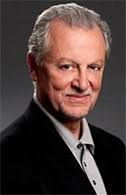
There’s Elmore Leonard’s famous 10 Rules of Writing, there’s Jack Bickham’s 38 Common Fiction Writing Mistakes, there’s the redoubtable Strunk and White. Every writer has favorites. Even when I read the same advice repeatedly, from numerous sources, it doesn’t always strike me the same way. Either I’ve reached a particular problem area in my own draft or someone’s slightly different slant on the topic finally makes it click. For that reason, I’m intrigued that PSWA member Joseph Badal has developed his own collection of rules, the first five of which are:
-
-
-
-
- Grab the reader by the throat with your first sentence.
- Tension is vital. Without tension, you risk boring the reader. Never do “boring.”
- Don’t use 10 words when 6 will do.
- Separate long sentences into two short sentences.
- Challenge the necessity of every word in your manuscript.
-
-
-
Badal is the author of 18 award-winning suspense novels and an Amazon #1 Best-Selling Author. To receive a complete list of Joe’s Writing Rules, email him at josephbadalbooks@outlook.com.
Publishing Tips and Travails
Short Crime Story Opportunities
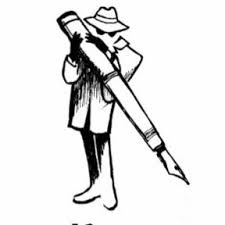 John Bluck kindly provided the following list of submissions calls from Murderous Ink Press:
John Bluck kindly provided the following list of submissions calls from Murderous Ink Press:
- Great Googly Moo! – planned for November 2024, with stories to feature humorous Private Eye fiction, 2,000 to 11,000 words
- A Load of Balls – planned for June 2025, crimes involving sports that use balls. Baseball’s taken, sorry.
- Can you Dig It? – planned for September 2025, crimes in the music biz.
For details on these projects and others that will be announced later this year, visit the Murderous Ink Press website.
Series editor Michael Bracken has published submission guidelines for the inaugural volume of “Best Private Eye Stories of the Year” for stories published in 2024, guest editor Matt Coyle. The deadline is December 31, so you have plenty of time to get ready.
Setting Up Your Book for Success
A recent interview with author Devorah Heitner delved into what she did to hit the best-seller list with her nonfiction parenting book. Even if best-sellerdom isn’t your goal, and even though you write fiction, you naturally want to maximize sales and give as many people as possible the chance to read your work.
Heitner started with a pre-order campaign, using her email list. She’s built up an impressive number of subscribers by having people sign up at her speaking events. Don’t have an email newsletter? It’s the top recommendation of many book marketers, including Tim Grahl, author of Your First 1000 Copies. Some sources say you need to send your newsletter out every month, though the best author newsletters I receive are sent quarterly, and that’s how often I send mine.
People who sign up for my newsletter receive the .pdf of three of my award-winning short stories (marketers call this a “reader magnet”). Don’t get me wrong. An email newsletter is work. But writing my novel was work, too. I owe it to myself to try!
Looking for a Literary Agent?
Here are six free literary agent databases to check out. You probably know about some of them; others may be new to you. I’ve used QueryTracker and Manuscript Wish List, but, no fault of the technology, no agent so far.
AI AgaIn
 A new “future of fiction” survey by Wattpad and Wakefield Research, published by Forbes, shows that 92% of readers think it’s important for humans to be involved in the creation and production of books. And, four out of five of readers prefer that reading recommendations come from a person, not an algorithm. (There goes the Amazon Ads business model, right there.) “Ordinary readers already seem to know that an AI-generated story would not be something interesting to read,” the article said.
A new “future of fiction” survey by Wattpad and Wakefield Research, published by Forbes, shows that 92% of readers think it’s important for humans to be involved in the creation and production of books. And, four out of five of readers prefer that reading recommendations come from a person, not an algorithm. (There goes the Amazon Ads business model, right there.) “Ordinary readers already seem to know that an AI-generated story would not be something interesting to read,” the article said.
While people may not want AI-produced fiction, they’re getting it, and the gatekeepers aren’t necessarily recognizing it. Japanese author Rie Kudan, who received the Akutagawa Prize, admitted that Chat GPT wrote about 5% of her book—a pale accomplishment compared to the Chinese professor whose science fiction novel completely written using AI also won a national competition.
The number of fake, AI-generated books available on Amazon (and potentially both cutting into your sales and devaluing your “brand”) is proliferating. Some AI-generated books claim to be by a real author, some share the title of a real book, and others are pure AI fiction. “It’s getting easier and easier to generate books with AI, and we’re seeing more of them,” says Mary Rasenberger, executive director of the Authors Guild. Amazon has taken steps to counter the problem, but so far, they’ve been insufficient.
In case this topic remains off your radar screen, there’s this from Jensen Huang, CEO of Nvidia, maker of the chip that is powering the AI revolution: he says the technology’s ability to produce superior prose “will come for the fiction writers first.”
Book Sales and Earnings
 BookScan reports that sales of print books in the US were down 3% in 2023, compared to the previous year, though adult fiction print sales grew by1%, the fifth year of growth. The genres leading sales are fantasy, romance, coming-of-age, and historical fiction. Young adult fiction also gained in 2023, driven by the dystopian, romance, and thriller genres (horror- and fantasy-adjacent, I’d guess). BookScan collects print book data from stores and on-line, but does not track ebook sales. So all those Kindle books you sold? Not in the data.
BookScan reports that sales of print books in the US were down 3% in 2023, compared to the previous year, though adult fiction print sales grew by1%, the fifth year of growth. The genres leading sales are fantasy, romance, coming-of-age, and historical fiction. Young adult fiction also gained in 2023, driven by the dystopian, romance, and thriller genres (horror- and fantasy-adjacent, I’d guess). BookScan collects print book data from stores and on-line, but does not track ebook sales. So all those Kindle books you sold? Not in the data.
Almost 5,700 US published authors participated in the Author’s Guild 2023 Author Income Survey. Here are some highlights.
- Half of all full-time authors continue to earn below minimum wage from book sales and other author-related work, such as teaching, freelance editing, blogging, and the like, and well below the federal minimum wage ($7.25 per hour) from their books alone.
- Full-time authors with at least five years’ self-publishing experience reported a median income of $24,000, a combination of book sales and author-related work.
- Traditionally published authors had a median income of $10,000 from books alone, and another $10,000 from author-related work.
- Full-time authors of romance and romantic suspense earned triple the income of mystery, thriller, and suspense writers.
- The median book income for mystery, thriller, and suspense authors was $10,000, with additional author-related income of about $5,010.
Amazon releases more than 1.4 million self-published books through KDP each year, which explains the pressure on authors for marketing and promotion.
Editor’s Turn
Odds and ends of interest to writers about public safety. Starting with a joke found on Facebook:
Ways to Fix Writer’s Block
-
- try turning the author on and off again
- let them talk, they might talk themselves out of their own mess
- if they’re crying, put them in a bag of rice
- say ‘give up then’ in a comforting way and watch them get back to work out of sheer spite.
 The Wounded Blue
The Wounded Blue
Your editor appreciated member Dean Cobet’s information on The Wounded Blue organization, based in Las Vegas. The organization works “to improve the lives of injured and disabled law enforcement officers.” One of its efforts uses peer support to help officers with emotional trauma. At a broader level, the organization works to destigmatize mental health issues within the law enforcement community.
An issue Mike Black, Bill Powers, and Bruce Coffin raised in the Zoom panel (described above) was how, in books and movies, officers involved in a fatal shooting just turn up at the office the next day, and nothing is said. No shooting review board, no administrative leave. And, worse, no emotional repercussions. While we know fiction cannot correspond exactly to reality, this creates a false impression that police involved in shootings are not severely affected—something The Wounded Blue is working to counteract.
The photo is the Arizona Peace Officers’ Memorial in Wesley Bolin Memorial Plaza, Phoenix. The annual Police Officers’ Memorial Day will be May 15.
Americans Working Hardest
What are the most physically demanding jobs in America? Results of a five-year, federal “Occupational Requirements Survey” by the Bureau of Labor Statistics are in. On almost every important parameter, firefighters face the most demanding conditions. They have to lift or carry the heaviest weight (ambulance drivers are next, followed by EMTs, paramedics and police officers); they are the workers most exposed to extreme heat or hazardous materials, they have the greatest need to hear speech at a distance; and they are least able to control their workload. Apparently, the survey didn’t look at workers’ exposure to violence and out-of-control people. We know which professions would lead that category too.
The Ghost Army
Here’s a link to a short video about the army’s secret WWII “Ghost Army,” (the 23rd Headquarters Special Troops) whose mission was to deceive the enemy through camouflage, illusion, impersonation, fake equipment, sound effects, and so on, in order to decrease the risk of detection for the “real” fighters. Very inspiring! The existence of the Ghost Army was kept secret for decades, and now being broadly revealed–rather spectacularly, by awarding it the Congressional Gold Medal, the highest award from the US Congress. For more, see the Ghost Army Legacy Project. Some of their inflatable tanks pictured below!
